Best AI courses for accountants in 2025
Explore top AI courses for accountants in 2025, designed to enhance skills and adaptability in a rapidly evolving profession.

Artificial intelligence is reshaping accounting, making it crucial for professionals to learn AI skills. By 2025, 21% of tax firms use generative AI, up from 8% in 2024, while 52% of accounting staff rely on tools like ChatGPT for tasks. AI helps accountants save time, improve accuracy, and focus on advisory roles, with advanced users saving 79 minutes per task.
To stay competitive, accountants should consider these top AI courses:
- Upskillist: Affordable, flexible learning with a globally recognized certificate.
- CPA Alberta's AI Tools Course: Practical focus on tools like ChatGPT, offering CPD hours.
- Wharton (University of Pennsylvania): AI for business strategy, including financial forecasting.
- CFTE's AI in Finance Specialization: Industry-focused with insights from top experts.
- Columbia Business School: Executive-level training blending AI and finance.
- edX Introduction to AI for Accountants: Beginner-friendly with verified certificates.
- FutureLearn's AI in Financial Services: Covers automation and fraud detection.
- Coursera's Data Analytics & AI for Accountants: Combines AI and data analytics.
- AICPA/CPA.com's AI Certificate: Tailored to U.S. CPAs, focusing on compliance and efficiency.
- Udemy's AI in Financial Reporting: Cost-effective, on-demand training for reporting tasks.
These courses cater to various needs, from beginner to advanced, offering certifications, flexible formats, and practical applications for U.S. accountants. Investing in AI skills not only boosts efficiency but also opens doors to higher-paying, strategic roles in the evolving accounting landscape.
Webinar: A beginner’s guide to AI for accountancy and bookkeeping, with ACCA
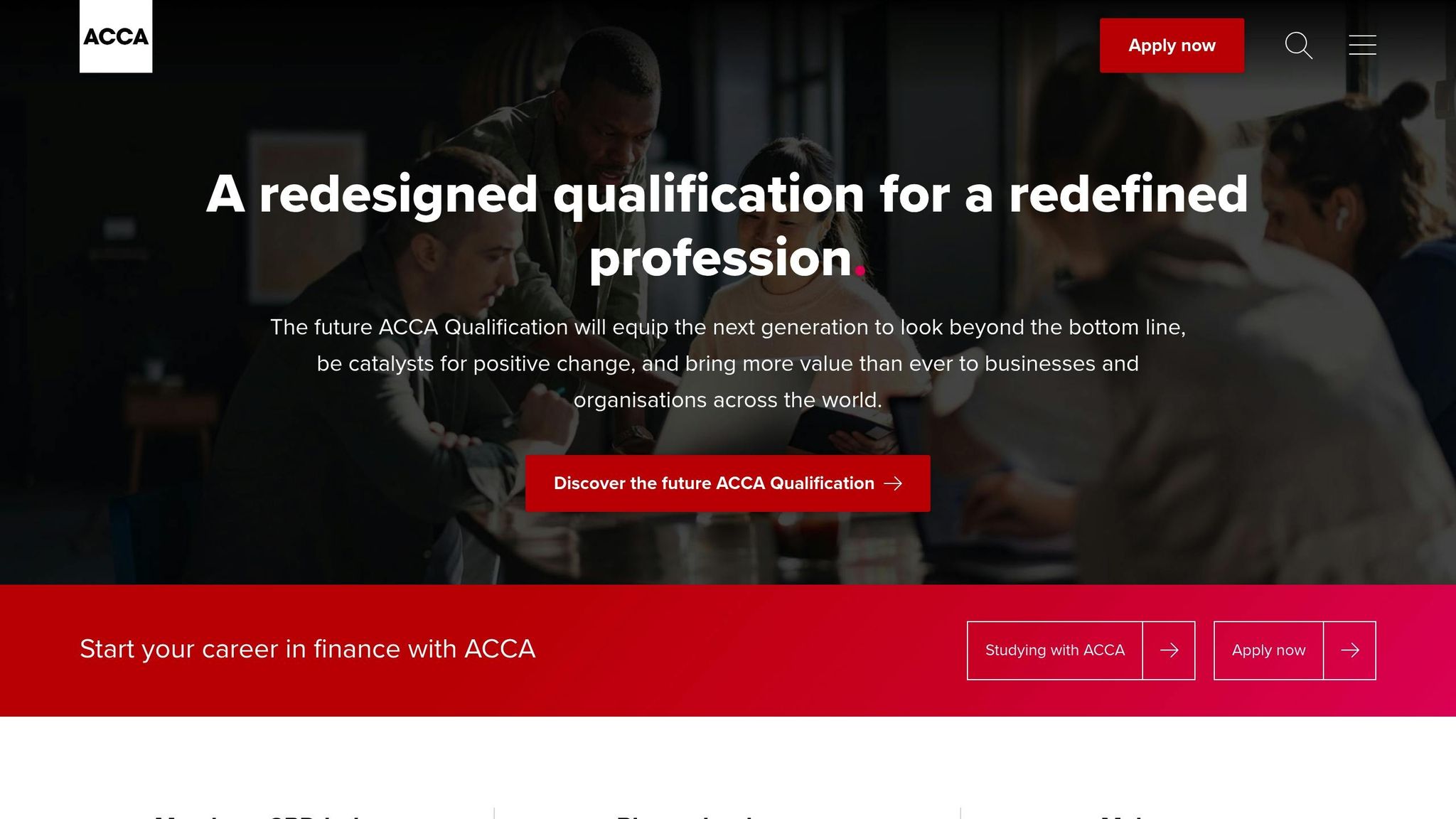
How to Choose an AI Course for Accountants
AI is reshaping the accounting world, and selecting the right course can equip you with practical skills that make a real difference in your daily work. Here's what to look for to ensure the course you pick delivers immediate, actionable benefits.
Prioritize Human-AI Collaboration
The best courses focus on how humans and AI can work together - not replace each other. Look for programs that teach "Human in the Loop" concepts, where AI handles repetitive tasks while you retain control over critical decisions. Studies show that accountants who use AI strategically achieve the greatest performance improvements. These courses help shift your focus from routine tasks to higher-value work like strategic analysis, client communication, and applying professional judgment.
Practical Applications Aligned with Real-World Accounting
Choose courses that dive into real-world accounting scenarios. For instance, they should teach you how to automate tasks like data entry and invoice processing, use AI for fraud detection, and apply predictive analysis to financial data. Practical applications like these ensure the skills you learn are directly transferable to your job.
Training on Data Quality and Bias Awareness
AI is only as good as the data it uses. Effective courses emphasize the importance of data quality and teach you how to recognize and address biases in AI systems. This ensures the accuracy and reliability of your AI-driven analyses.
Focus on US Compliance and Regulations
If you work in the US, it’s crucial to choose a course that covers local regulations and business practices. For example, the course should explain how AI tools manage US currency formats, comply with standards like ASC 842 for lease accounting, and operate within the US regulatory framework. This knowledge is essential for maintaining compliance in a highly regulated environment.
Develop Critical Thinking and Judgment Skills
AI can provide valuable insights, but accountants still need to critically evaluate its outputs. The best courses teach you how to interpret AI confidence scores and apply professional judgment to avoid mistakes and ensure compliance with regulations.
Hands-On Training with Relevant Tools
Practical experience is key. Look for courses that offer hands-on training with tools accountants actually use, such as AI-integrated accounting software or generative AI for technical research and writing. This kind of training ensures you can immediately apply what you’ve learned in your day-to-day work.
Flexible Learning Options
Your schedule is busy, so flexibility matters. Many accountants prefer self-paced online courses that fit around client deadlines, tax season, or month-end closings. These courses allow you to learn at your own pace without disrupting your professional responsibilities.
Accreditation and Professional Recognition
A course with proper accreditation adds credibility to your resume and reassures employers and clients of your expertise. Additionally, some programs offer continuing professional education (CPE) credits, letting you meet annual certification requirements while building your AI skills.
1. Upskillist: AI for Accountants Program

This program earns its spot on the 2025 list for its practical and adaptable approach. Upskillist's AI for Accountants Program is tailored for professionals looking to seamlessly integrate AI into their accounting workflows. It offers hands-on training designed to fit into even the busiest schedules.
The course focuses on the balance between AI tools and human expertise. It teaches accountants how to use AI for tasks like data entry and invoice processing, allowing more time for strategic decision-making and client-focused work. Here’s a closer look at what makes this program a standout choice for accountants embracing AI.
Flexibility and Learning Format
The program’s on-demand setup is perfect for busy professionals. You can set your own pace, pause during hectic periods, and pick up exactly where you left off. Learning materials are diverse - videos, notes, and slides - so you can choose the format that works best for you.
Cost (in USD) and Value for Money
For $39.99 per month, you get unlimited access to over 80 courses, each offering 20 hours of practical training. The program has an impressive 4.8/5 rating from users, and a 7-day free trial allows you to explore the platform without any long-term commitment.
Accreditation and Recognition
Completing the program earns you a globally recognized certification, along with module-based certificates from respected universities. These credentials are backed by continuous assessments, ensuring your skills are thoroughly validated.
2. AI Tools and Strategies for Accountants (CPA Alberta / CPA Western Provinces)
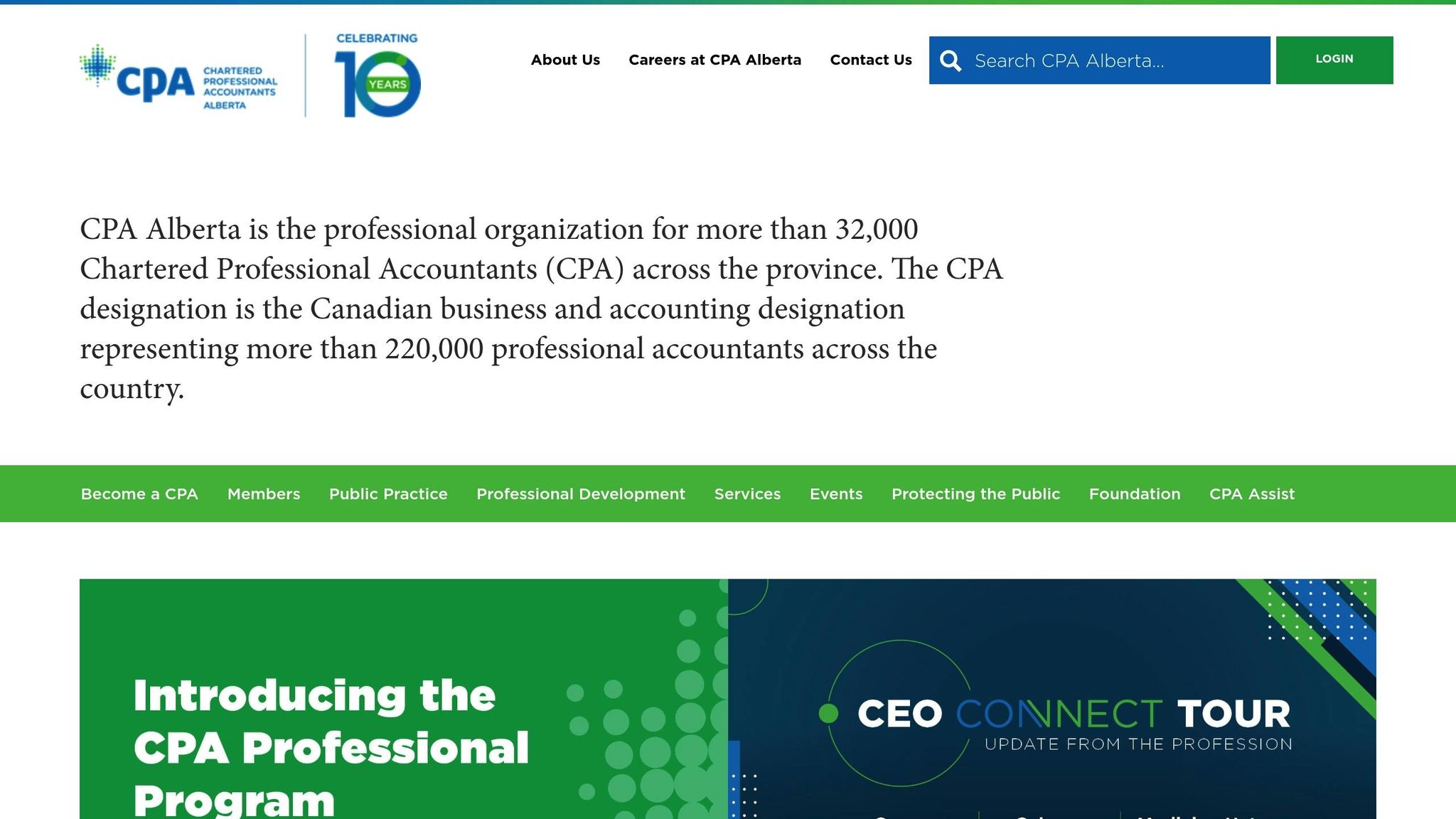
This course is all about helping accountants integrate AI into their daily work. Created by CPA Alberta in partnership with CPA Western Provinces, it focuses on how to use popular AI tools like Microsoft Copilot and ChatGPT in practical, day-to-day accounting scenarios. Below, we'll dive into its accreditation, hands-on applications, and flexible learning approach.
Accreditation and Recognition
When you complete this course, you'll earn 4 Continuing Professional Development (CPD) Hours. While the program is offered by Canadian accounting organizations, it's designed for accountants everywhere. U.S. accountants, in particular, can benefit from the skills taught here, as they address universal challenges like improving efficiency, managing risks, and making ethical decisions. These topics align closely with the professional standards required in the U.S. accounting industry.
Practical Applications for Accounting
The course doesn't just teach the theory behind AI; it shows you how to put it to work. You’ll learn how to integrate AI tools into your existing workflows, enhancing your ability to make sound professional judgments rather than relying on full automation. The focus is on using AI to complement your expertise, not replace it.
Flexibility and Learning Format
One of the standout features of this course is its accessibility. The material is presented in straightforward language, making it approachable even if you're not a tech expert. There’s no need to dive into programming or advanced technical details. Instead, the course helps you quickly spot opportunities to apply AI tools in your everyday tasks. It’s designed to equip you with actionable skills, so you can start using AI effectively without delay. This practical approach ensures you’re ready to meet the growing demand for AI knowledge in the accounting field.
3. AI for Business Specialization (University of Pennsylvania)

The Wharton School at the University of Pennsylvania offers a specialization designed to explore how AI can enhance strategic decision-making. While it’s not specifically tailored for accountants, the program dives into AI concepts that are highly relevant to areas like financial analysis, risk management, and business intelligence. By blending business acumen with AI principles, this program provides a strong foundation for applying AI in professional contexts.
Accreditation and Recognition
This specialization is backed by the prestigious Wharton School and taught by its experienced faculty. Participants who complete the program receive a certificate from the University of Pennsylvania, underscoring the program's focus on integrating AI with business strategy.
Practical Applications for Accounting
Rather than focusing on technical programming, the program highlights strategic uses of AI, making it particularly valuable for accountants. Topics include evaluating AI-driven initiatives, applying machine learning for financial forecasting, and developing AI frameworks. It also addresses critical areas like ethics and compliance in financial reporting and auditing, giving accountants actionable tools to enhance their decision-making capabilities in financial roles.
Flexibility and Learning Format
The program is delivered through self-paced courses, making it accessible for busy professionals. It includes video lectures, case studies, and hands-on projects that replicate real-world business challenges, offering a practical balance between theory and application.
Cost and Value for Money
Enrollment costs and schedules vary, but the program provides a cost-effective way to gain strategic AI expertise compared to traditional degree programs.
4. AI in Finance Specialisation (CFTE)

The Centre for Finance, Technology & Entrepreneurship (CFTE) has introduced the first online AI in Finance Specialisation, designed to guide professionals through the essentials of AI and its applications in the finance industry. This program dives into both the opportunities and challenges of implementing AI, making it a great resource for accountants eager to explore how artificial intelligence can reshape their profession.
Accreditation and Recognition
This program is accredited in partnership with Ngee Ann Polytechnic and recognized by CPD, ACT, and IBF. Upon completion, participants receive a certificate issued by CFTE, which can be showcased on platforms like LinkedIn. The certification not only enhances professional credibility but also aligns with practical accounting needs.
Adding to its reputation, the AI in Finance Academy, which has already trained over 20,000 professionals worldwide, backs this program. Participants benefit from insights shared by 72+ industry experts from top organizations such as Citi, UBS, and PwC. These experts bring firsthand knowledge of how AI is being applied in leading financial institutions.
Practical Applications for Accounting
The course equips accountants with tools to optimize financial workflows, improve the accuracy of reporting, and boost analytical capabilities using AI and machine learning. These skills align with the broader trend of using AI to enhance efficiency and support strategic decisions in accounting.
For career-minded accountants, this program is a game-changer. It opens doors to roles at the intersection of finance and technology, including opportunities in open banking and fintech. By mastering AI, professionals can position themselves for roles in a rapidly evolving financial landscape, ensuring they stay ahead in a competitive market.
"Thousands of learners have used insights from this programme to directly improve their careers." - CFTE
Flexibility and Learning Format
This program is tailored to fit into busy schedules, offering a self-paced online format. The structured curriculum covers the most relevant AI trends, allowing participants to study at their own speed while balancing their professional responsibilities.
The learning experience is enriched by contributions from leaders in financial institutions, startups, investment firms, and regulatory bodies. This variety of perspectives ensures participants gain a comprehensive understanding of how AI is shaping different areas of the finance sector.
Cost and Value for Money
The AI in Finance Specialisation is priced at £600 (around $720 USD), excluding 20% VAT. CFTE also offers an option to pay in three interest-free installments of £200 (excluding VAT).
This program is highly rated among finance professionals, offering a strong return on investment. With its robust curriculum, expert-led instruction, and multiple accreditations, it provides an excellent opportunity for accountants looking to incorporate AI expertise into their professional toolkit.
5. AI for Business & Finance (Columbia Business School ExecEd x Wall Street Prep)
Columbia Business School's Executive Education program, in partnership with Wall Street Prep, offers a course designed to blend rigorous academic insights with hands-on financial training. Tailored for finance professionals, the program focuses on incorporating AI strategies into financial workflows, leveraging Columbia’s academic strength and Wall Street Prep’s expertise in financial education. This combination makes it particularly useful for accountants looking to enhance their skills in financial analysis and strategic decision-making with AI.
Accreditation and Recognition
Participants who complete the program earn a certificate from Columbia Business School Executive Education. This credential reflects the program’s focus on combining in-depth business education with practical financial applications. It serves as a recognized testament to the participant's ability to integrate AI into business and finance, emphasizing skills that go beyond theory and into actionable expertise.
Practical Applications and Learning Format
The course prioritizes real-world applications of AI in finance. Through interactive case studies, live virtual sessions, and self-paced modules, participants gain practical experience in implementing AI-driven solutions. The curriculum also addresses important ethical and regulatory considerations, ensuring a well-rounded understanding of AI’s role in financial processes.
Investment and Value Proposition
For finance professionals eager to elevate their careers with advanced AI knowledge, this program offers a strong opportunity to develop relevant, actionable skills that align with the evolving demands of the industry.
6. Introduction to AI for Accountants (edX)
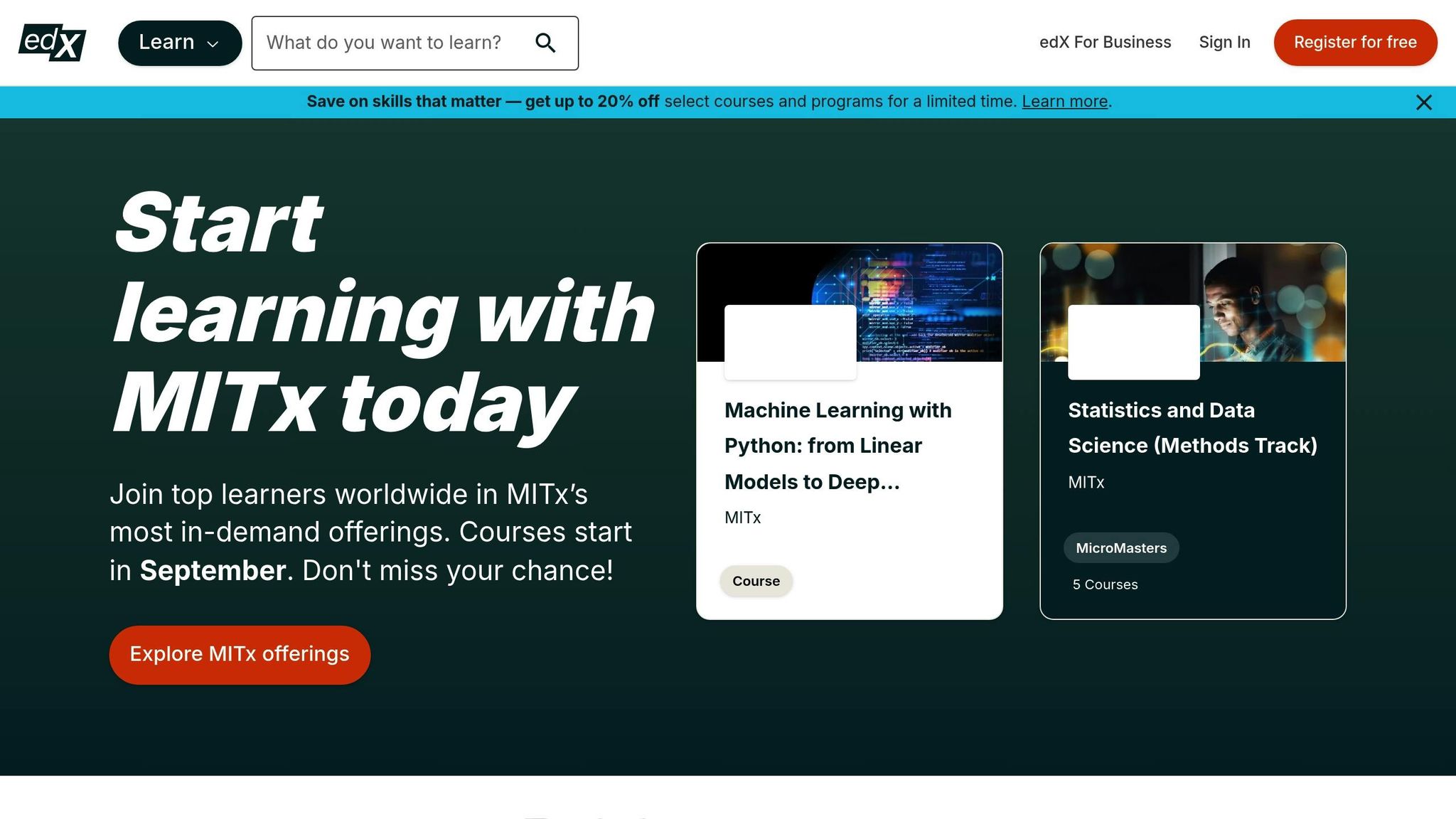
The edX platform offers a course titled Introduction to AI for Accountants, designed to give accounting professionals a solid understanding of how AI is reshaping their field. This course is ideal for those who want to learn about AI concepts without getting lost in overly technical jargon. It focuses on real-world applications, helping accountants see how AI can enhance their everyday tasks.
Accreditation and Recognition
One of the standout features of this course is the opportunity to earn a verified certificate upon completion. This credential, provided by edX, can be added to your LinkedIn profile, resume, or other professional materials to showcase your achievement. To obtain the certificate, participants need to complete assignments, meet the passing criteria, and finish the course within its specified timeline.
Practical Applications for Accounting
The course dives into how AI tools can seamlessly integrate into accounting processes, streamlining workflows and boosting efficiency. Instead of dwelling on theoretical aspects, it equips professionals with the ability to spot areas where automation can make their work more effective and less time-consuming.
Flexibility and Learning Format
This course is structured as a self-paced program, making it easy for busy professionals to fit learning into their schedules. By enrolling in the verified certificate track, participants gain unlimited access to course materials and videos for the duration of the course, allowing them to revisit and reinforce their learning whenever needed.
Cost and Value for Money
While the exact price for this course isn't listed, most edX verified certificate tracks are priced between $90 and $300. This makes it a cost-effective option for accountants looking to build a strong understanding of AI while earning a valuable certification to enhance their professional credentials.
7. AI and Automation in Financial Services (FutureLearn)

FutureLearn's AI and Automation in Financial Services course explores how automation is transforming the financial industry. While it’s not exclusively designed for accountants, it offers insights that are highly relevant for accounting professionals working in large financial organizations. This course lays a solid foundation for understanding automation, leading into practical techniques that can be applied in real-world scenarios.
Practical Applications for Accounting
The course highlights how AI-powered automation simplifies routine accounting tasks. It delves into tools like Robotic Process Automation (RPA) for handling data entry, machine learning for detecting fraud, and automated reporting systems that make preparing financial statements more efficient.
Case studies from leading financial institutions bring these concepts to life. Participants explore how Natural Language Processing (NLP) can categorize transactions and how predictive analytics can forecast cash flow - skills that are becoming essential for today’s accountants.
Flexibility and Learning Format
FutureLearn emphasizes a practical, community-driven approach to learning. The course is structured as a social learning experience, allowing participants to engage with peers through discussion forums while progressing at their own pace. It spans several weeks, with flexible scheduling to accommodate busy professionals.
Each week dives into a specific aspect of AI implementation in financial services, featuring video lectures, interactive exercises, and hands-on assignments. Participants gain access to downloadable resources and case studies that can be applied directly in their work. The time commitment is manageable, requiring about 3–4 hours per week.
Cost and Value for Money
A free version of the course provides access to most materials and community discussions. For those wanting additional benefits, an upgrade is available for $49–$99, depending on the course duration and the institution offering it.
The paid option includes perks like a certificate of achievement, unlimited access to course materials, and the ability to complete assignments with feedback. This affordable pricing, combined with its practical focus, makes the course a useful resource for accounting professionals navigating the rise of automation in their field.
8. Data Analytics & AI for Accountants (Coursera)
Coursera's Data Analytics & AI for Accountants is a self-paced online program designed specifically for accountants who need to juggle work responsibilities alongside professional growth. This course offers the flexibility to learn at your own speed, making it easier to fit education into a busy schedule.
Flexibility and Learning Format
The course is available online through both web and mobile platforms, giving learners the freedom to study whenever and wherever it suits them. While the program is structured to require about 10 hours of study per week over a recommended 3-month period, many participants complete it in 5–7 months. It builds on foundational accounting skills by integrating data analytics and AI, equipping accountants to tackle the challenges of a technology-driven industry.
"To be able to take courses at my own pace and rhythm has been an amazing experience. I can learn whenever it fits my schedule and mood." - Felipe M., Learner since 2018
9. AI for Accountants Certificate (AICPA / CPA.com)
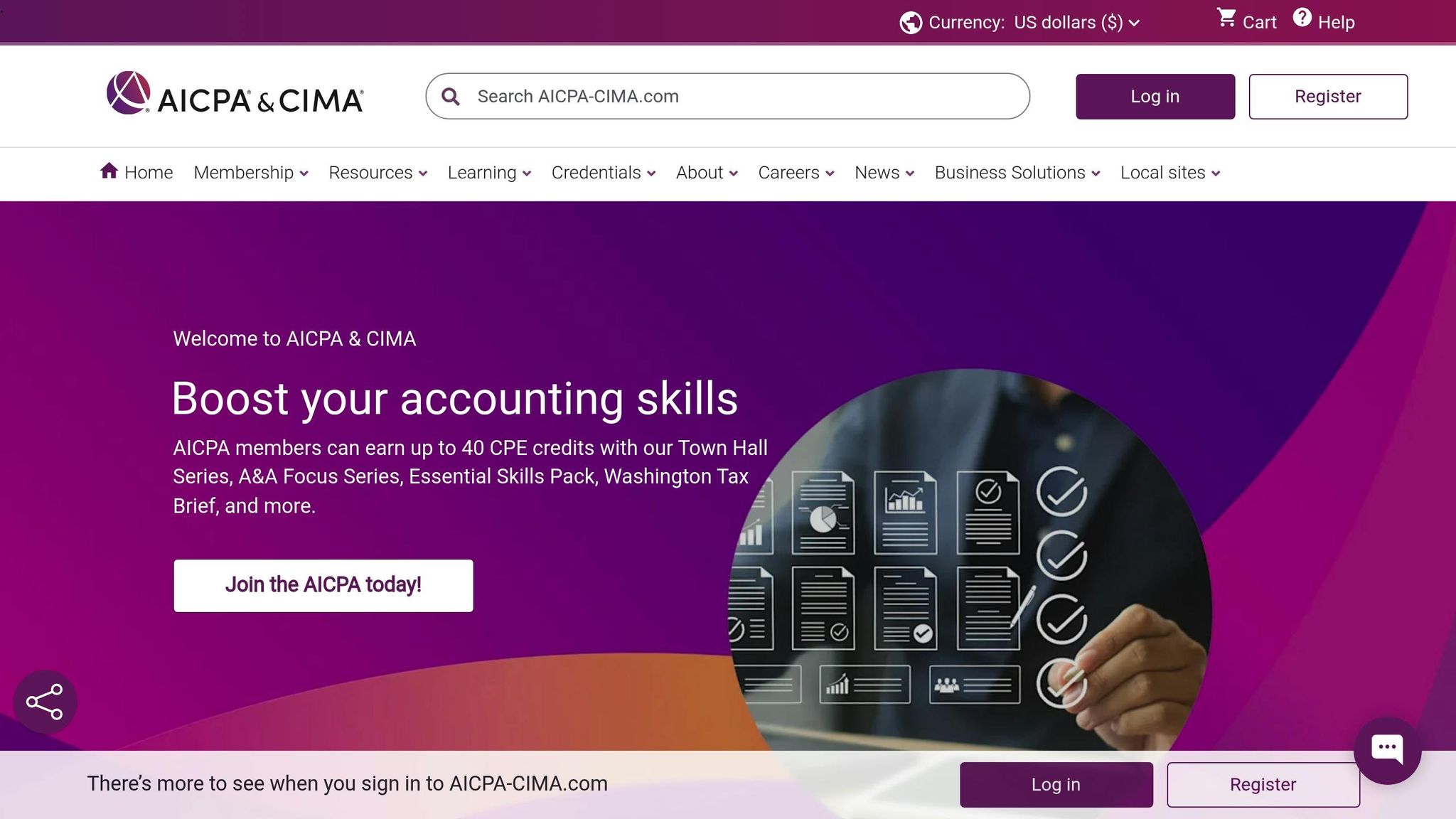
The AI for Accountants Certificate, created by AICPA in partnership with CPA.com, is tailored to equip accounting professionals with hands-on AI skills. The focus is on using AI to tackle real-world challenges in the accounting field.
Accreditation and Recognition
This program is backed by AICPA, one of the most respected organizations in the accounting industry. Designed to complement ongoing professional education, the certificate is widely recognized by employers and signals a dedication to staying on top of emerging technologies in accounting. With this strong endorsement, participants can trust the program’s focus on delivering practical and actionable knowledge.
Practical Applications
The curriculum dives into how AI can improve financial analysis, simplify repetitive tasks, and assist in decision-making while aligning with U.S. compliance standards. It also addresses how to apply AI solutions specifically to accounting-related problems. Additionally, the program explores ethical considerations and regulatory compliance, ensuring participants are prepared to use AI responsibly in their work.
Flexible Learning Format
Understanding the demands of a busy professional life, the program is offered entirely online through CPA.com’s platform. Its self-paced structure allows participants to work through interactive content, practical exercises, and case studies at their own convenience, making it easy to balance learning with work commitments.
Boosting Career Opportunities
Enrolling in this program is a smart move for accountants looking to expand their AI knowledge and advance their careers. By gaining skills that align with today’s technology-driven financial environment, participants position themselves as forward-thinking professionals ready to thrive in an AI-influenced future.
10. AI in Financial Reporting (Udemy)
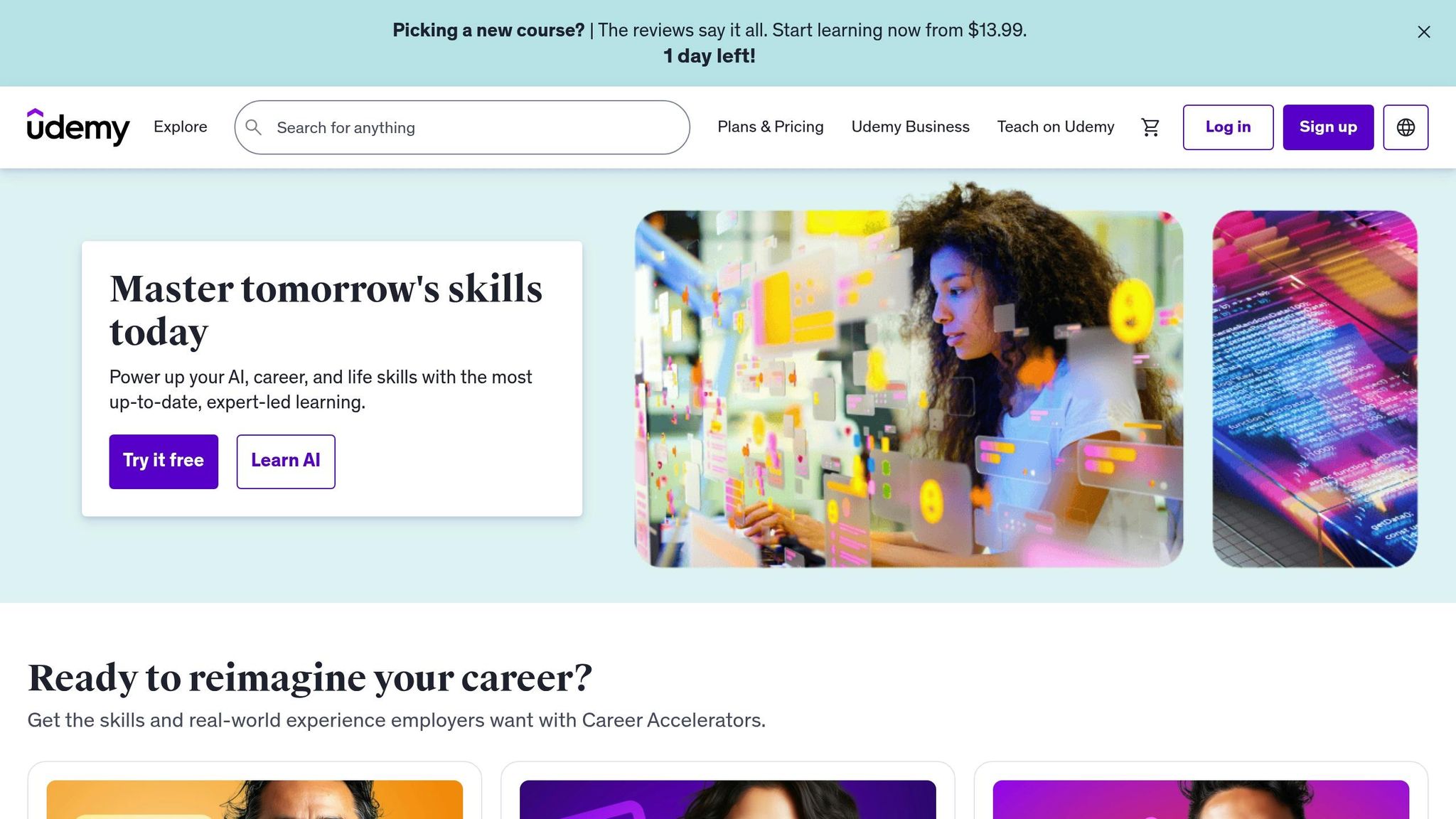
Udemy’s AI in Financial Reporting course is tailored for busy accounting professionals, offering the flexibility to fit learning into your schedule without disrupting work or personal life. Whether you're starting fresh or revisiting concepts, the course allows you to progress at your own pace, making it a practical choice for those juggling multiple commitments.
With lifetime access to all course materials and compatibility with both iOS and Android mobile apps, you can learn wherever and whenever it’s convenient. Whether you're commuting, traveling, or simply taking a break, the course ensures you can revisit complex topics and keep your skills sharp.
The course includes interactive elements like discussion forums, Q&A sections, video lectures, and hands-on exercises. These features cater to different learning preferences, making it easier to grasp concepts and apply them in real-world scenarios. This flexible and engaging format helps you enhance your accounting expertise without interrupting your daily responsibilities.
Course Comparison Table
Here's a detailed comparison of AI courses tailored for accountants, highlighting key factors to help you make an informed choice:
| Course | Provider | Format | Duration | Cost (USD) | Certification | US Relevance |
|---|---|---|---|---|---|---|
| AI for Accountants Program | Upskillist | Online, Self-paced | 8–12 weeks | Subscription-based (7-day free trial) | Globally recognized certificate | High – US accounting standards focus |
| AI Tools and Strategies for Accountants | CPA Alberta / CPA Western Provinces | Online, Instructor-led | 6 weeks | $595 | CPA-recognized certificate | Medium – Canadian focus, transferable skills |
| AI for Business Specialization | University of Pennsylvania (Coursera) | Online, Self-paced | 4 months | $49/month | University certificate | High – US business practices emphasis |
| AI in Finance Specialisation | CFTE | Online, Self-paced | 8–10 weeks | $1,200 | Professional certificate | High – Global finance focus |
| AI for Business & Finance | Columbia Business School ExecEd x Wall Street Prep | Online, Cohort-based | 6 weeks | $2,995 | Executive certificate | Very High – US finance industry focus |
| Introduction to AI for Accountants | edX | Online, Self-paced | 4–6 weeks | $99–$299 | Verified certificate | Medium – General accounting principles |
| AI and Automation in Financial Services | FutureLearn | Online, Self-paced | 5 weeks | $149 | Certificate of completion | Medium – UK-based, yet applicable globally |
| Data Analytics & AI for Accountants | Coursera | Online, Self-paced | 3 months | $39/month | Professional certificate | High – US accounting software integration |
| AI for Accountants Certificate | AICPA / CPA.com | Online, Self-paced | 10–15 hours | $299 | AICPA certificate | Very High – US CPA standards alignment |
| AI in Financial Reporting | Udemy | Online, Self-paced | 8 hours | $84.99 | Certificate of completion | Medium – General reporting principles |
Key Takeaways for Decision-Making
- Budget-Friendly Options: If you're looking to save, check out Upskillist, which offers a subscription model with a 7-day free trial, or Udemy's one-time payment of $84.99.
- Time Commitment: Short on time? The AICPA certificate program only requires 8–15 hours, while other courses, like the University of Pennsylvania's specialization, span several months.
- Certification Value: The AICPA certificate is highly respected among US accountants. For academic credibility, Columbia Business School and the University of Pennsylvania offer university-backed credentials. Upskillist’s globally recognized certification can also enhance your resume.
- US-Specific Relevance: If you're working with American accounting standards or regulations, courses from Columbia Business School and AICPA are tailored to meet those needs effectively.
This table and the insights above should help you pinpoint the course that aligns best with your needs, whether you're focused on budget, time, certification prestige, or US relevance.
How AI Skills Impact Accounting Careers
The accounting field is undergoing a major shift as AI changes the way financial professionals do their jobs. Accountants who embrace AI education are paving the way for new career opportunities and increasing their value in a competitive market.
One of the most immediate advantages of AI in accounting is workflow automation. Tasks like processing invoices, categorizing expenses, and reconciling accounts that used to take hours can now be completed in minutes. By automating these repetitive processes, accountants free up time to focus on more analytical and strategic work. But automation is just the beginning - AI also plays a key role in improving compliance.
With regulations constantly evolving, staying compliant has become more challenging than ever. Accountants with AI skills can use machine learning tools to automatically detect irregularities in transactions, ensure adherence to tax laws, and maintain detailed audit trails. This is especially critical in an environment where regulatory oversight is tightening, and the cost of compliance errors is rising.
For accountants with AI expertise, client advisory roles are expanding rapidly. Instead of just reporting past financial data, these professionals are using AI-powered predictive analytics to forecast cash flow, uncover cost-saving opportunities, and deliver strategic insights. This proactive approach not only strengthens client relationships but also allows firms to charge higher fees for enhanced services.
AI also boosts decision-making capabilities. Accountants can leverage AI tools for financial modeling and scenario analysis, enabling them to spot trends, predict market movements, and evaluate investments with speed and accuracy. This ability to provide data-driven insights makes AI-trained accountants invaluable to their organizations, often positioning them as key strategic partners and accelerating their career growth.
Beyond traditional accounting roles, AI skills are opening doors to areas like fintech consulting and business intelligence. As routine tasks become automated, early adopters of AI are becoming indispensable assets, often taking on leadership roles in digital transformation projects. These specialized roles not only come with higher salaries but also offer pathways to executive positions and partnership opportunities.
Remote work is another area where AI skills shine. With cloud-based AI platforms, accountants can serve clients from anywhere in the world, manage multiple projects at once, and scale their practices without being tied to a specific location. This flexibility aligns perfectly with the growing demand for AI-enhanced advisory services, allowing accountants to broaden their reach.
Specialization is another benefit of AI expertise. Some accountants focus on fraud detection algorithms, while others specialize in automated financial reporting or AI-driven tax strategies. These niche skills not only command premium rates but also open up highly profitable consulting opportunities.
Investing in AI education pays off in many ways. Accountants who complete AI training often enjoy higher salaries, greater job satisfaction, and more career options. As the accounting industry continues to evolve, professionals with AI expertise will play a leading role in shaping the future of financial services.
Conclusion
The accounting field is undergoing a major transformation, where understanding AI is no longer optional - it's a must. As we've seen throughout this guide, the courses available in 2025 provide practical ways for accountants to embrace AI technologies that are already reshaping how the industry operates.
Learning these skills now puts you in a prime position to lead future digital initiatives, earn higher salaries, and step into more advanced advisory roles. The accountants who make AI education a priority today will be the ones shaping the future, not just keeping up with it.
When choosing a course, think about where you are in your career and what you want to achieve. If you're just starting out, Introduction to AI for Accountants is a great place to begin. For those looking to specialize, courses in areas like financial reporting AI or business intelligence can give you the advanced tools to stand out in the field.
The benefits of investing in AI education show up quickly. Accountants with AI expertise don’t just work smarter - they open doors to career growth, flexible remote opportunities, and the ability to serve clients worldwide. With these skills, you’re not just adapting to change - you’re driving it.
FAQs
How can learning AI skills benefit my career as an accountant?
AI skills have the potential to reshape your career as an accountant. By automating routine tasks, analyzing financial data with greater precision, and supporting smarter decision-making, these tools allow you to focus on more meaningful work. For instance, you’ll have more time to take on strategic advisory roles - an area expected to see a sharp rise in demand by 2025.
Moreover, accountants with expertise in AI and data analytics often see a noticeable boost in earning potential. In many major U.S. cities, salaries for such professionals have risen by 45–50%. Adopting AI not only streamlines your workflow but also establishes you as a critical strategic asset in today’s fast-paced, tech-driven business landscape.
How can I choose the right AI course to support my career as an accountant?
When selecting an AI course, it's important to choose one that fits your career goals and meets the demands of the accounting field. Focus on programs that teach skills like automating financial tasks, analyzing data effectively, and leveraging AI tools for decision-making. Courses specifically designed for accountants are especially valuable, as they often include real-world examples and applications relevant to your profession.
Before committing to a program, take a close look at the course content, whether it's offered online or in-person, and if it provides certifications that could boost your resume. It's also worth ensuring the course delivers practical, job-ready skills to help you stay ahead in an industry increasingly shaped by AI.
What AI tools should accountants focus on to enhance their daily tasks?
Accountants stand to gain a lot by getting comfortable with AI tools tailored for financial forecasting, data analysis, and process automation. These tools can take the hassle out of repetitive tasks, boost precision, and offer sharper insights that support smarter decision-making.
A few key areas where these tools shine include automating expense tracking, creating financial reports, and using predictive analytics for budgeting and forecasting. By weaving these AI-powered solutions into their daily routines, accountants can save valuable time, minimize mistakes, and contribute more strategically to their organizations.

